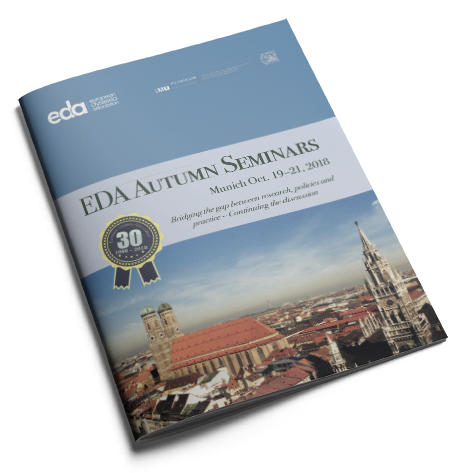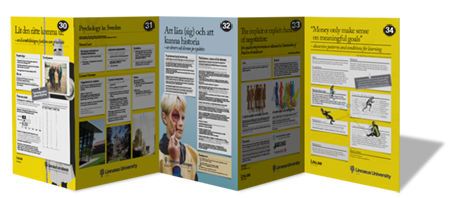
Please note: This is a PAST event and information here is for your reference only.
Programme and Presenters
Read more about our speakers and presenters together with their abstracts.
Abstracts plenary lectures 2018
Interactive posters can be found further down on this page.
Friday October 19
Updates are marked in green
| Time | Event | Location |
|---|---|---|
| Chair: | ||
| 11.30 -13.00 |
Registration and refreshments |
|
| 13.00 – 13.30 |
Opening Ceremony |
|
| 13.30 – 14.30 |
Keynote 1Prof. Bertram Müller-Myhsok: Genetics of dyslexia: recent findings and perspectives Abstract and presentation |
|
| 14.30 – 15.00 |
Presentation No 1Micaela Camia: Emotional and behavioural features in children with SLD: different opinions between parents Download abstract |
|
| 15.00 – 15.30 | Coffee break | |
| 15.30 – 16.00 |
Presentation No 2Maria Klatte: Effects of computerized grapho-phonological training in German third-graders with dyslexia Download abstract |
|
| 16.00 – 16.30 |
Presentation No 3Eddy Cavalli: Screening for dyslexia in French-speaking university students Download abstract |
|
| 16.30 – 17.30 |
Keynote 2Prof. Charles Hulme: Causal models of developmental reading disorder Abstract and presentation |
|
| 19.30 – (Please note the time) |
Social DinnerOnly for pre registered and prepaid guests. |
|
Saturday October 20
| Time | Event | Location |
|---|---|---|
| Chair: | ||
| 9.00 – 10.00 |
Keynote 3Prof. Arnold Wilkins: The mathematics of comfort and efficiency when reading Abstract and presentation |
Lecture Hall, Nußbaumstr. 7 |
| 10.00 – 10.30 | Coffee break | |
| 10.30 – 11.00 |
Presentation No 4Ellen Reynor: Beyond the DDH: Phonological processes, Naming Speed and Executive Processes in Irish Children with Reading Difficulties. Developing Learning Profiles to inform Effective Teacher Intervention and Practice Download abstract |
Lecture Hall, Nußbaumstr. 7 |
| 11.00 – 11.30 |
Presentation No 5Janette B. Jacobs: Dyslexia and syllogistic reasoning in adults: differences in strategy usage. Download abstract |
Lecture Hall, Nußbaumstr. 7 |
| 11.30 – 12.00 |
Presentation No 6Alice Cancer: The effect of a rhythm-based reading training combined with tDCS: A preliminary study on undergraduate students with dyslexia Download abstract |
Lecture Hall, Nußbaumstr. 7 |
| 12.00 – 13.30 |
Networking lunch break and Interactive Poster session 1(see abstracts below) |
|
| Chair: | ||
| 13.30 14.30 |
Keynote 4Prof. Fumiko Hoeft: Neurocognitive protective factors that promote resilience and compensation in individuals with dyslexia. Abstract and presentation |
Lecture Hall, Nußbaumstr. 7 |
| 14.30 – 15.00 |
Presentation 7Chiara Banfi: Functional alterations in children with dyslexia and isolated spelling deficits Download abstract |
Lecture Hall, Nußbaumstr. 7 |
| 15.00 – 15.30 | Coffee break | |
| 15.30 – 17.00 |
General AssemblyMember organisations only. |
|
| 17.00 – 18.30 |
EDA Members’ VoiceMember organisations only. |
Lecture Hall, Nußbaumstr. 7 |
Sunday October 21
| Time | Event | Location |
|---|---|---|
| Chair AM: | ||
| 9.00 – 10.00 |
Keynote 5Anny Cooreman: Reinforcing self-esteem within LD-students using adapted learning strategies. Abstract and presentation |
Lecture Hall, Nußbaumstr. 7 |
| 10.00 – 10.30 | Coffee break | |
| 10.30 – 11.30 |
Keynote 6Caroline Huron: From the laboratory to the classroom, dyspraxia as an illustration Abstract and presentation |
Lecture Hall, Nußbaumstr. 7 |
| 11.30 – 12.30 |
Interactive poster session 2 |
|
| 12.30– 13:00 |
Guest talkJose Puig: How European Agency for Special Needs and Inclusive Education can bridge the gap between research and practices Abstract and presentationNew item |
|
| 13.00 – 13.30 |
Closing ceremonyNew time |
Lecture Hall, Nußbaumstr. 7 |
Interactive posters

Visit the interactive posters and meet the authors. The following posters are on display:
SpLD ( Specific Learning Difficulty) students and support for learning: what works?
–Author: Kate Connery, University of Sheffield, UK.
Make it easy – Making Libraries Accessible for People with Dyslexia
–Author: Marie Engberg Eiriksson, Gladsaxe Public Libraries, Denmark.
The views of children on learning in a special reading school in Ireland
–Author: Trevor O’ Brien, Department of Educational Psychology, Inclusive and Special Education,
Mary Immaculate College (University of Limerick), Ireland
Iconic memory in adults with dyslexia
–Author: Pascale Colé, Aix Marseille University, CNRS, Laboratory of Cognitive Psychology, Marseille, France.
Teaching dyslexics students with the Targeted, Individual, Structured, Integrated Program in the lesson of history
–Author: Stavrou Giannis, University of Peloponnese, Kalamata, Greece.
The impact of using a C Reader Pen on the literacy skills of year 10 learners with English as an Additional Language/EAL
–Author: Tilly Mortimore, Bath Spa University, UK.
Analysis of Misspellings in German Orthography in Grade 3 to 6
–Author: Konstanze Edtstadler, University College of Teacher Education Styria, Austria.
Comic to the Rescue: Improving Reading Comprehension in Dyslexia
–Author: Hélène Brèthes, Aix-Marseille Université, Laboratoire de Psychologie Cognitive, France.
The Imagery-Language Connection: Improving Word Reading In Children With Dyslexia
–Author: Angelica Benson, Lindamood-Bell Learning Processes, USA.
Confrontation naming and reading abilities: a longitudinal cohort study
–Author: Cristiano Termine, Child Neuropsychiatry Unit, Department of Medicine and Surgery, University of Insubria, Italy.
Positive Psychology in School: Investigating symptoms of anxiety and self-esteem in dyslexic and non-dyslexic adolescents, and enhancing learning potential with Mindfulness-based intervention
–Author: Panagiota Blouchou, Department of Psychology, The University of Sheffield, UK.
Sensory processing profile and learning
–Author: Stephanie Armstrong, The University of Sheffield, UK.
Individual differences in the acquisition of non-linguistic audio-visual associations in kindergartners
–Authors: Irene Altarelli1, Ghislaine Dehaene-Lambertz2 and Daphne Bavelier3,4.
1. CNRS UMR 8240, Laboratory for the Psychology of Child Development and Education, University Paris Descartes, Sorbonne Paris Cité, Paris, France.
2. Cognitive Neuroimaging Unit U992, INSERM, CEA DRF/Institut Joliot, Université Paris-Sud, Université Paris-Saclay, NeuroSpin Center, Gif/Yvette, France.
3. Department of Brain & Cognitive Sciences, University of Rochester, Rochester, NY, USA.
4. Faculty of Psychology and Education Sciences, University of Geneva, Switzerland.
Flexible support organisation – a way to organise education in a diverse society
A school improvement project in Jönköping municipality, Sweden
–Authors: Pernilla Söderberg, Alexandra Malkovich-Johansson, Åsa Nyberg, Elisabeth Nordevall, Annika Nordgren, Monica Ljungstrand, Annika Malm, Elisabeth Persson. Jönköping municipality, Sweden
Skies of Manawak: Enhancing reading speed in children with dyslexia through a video game for cognitive training
–Authors: Angela Pasqualotto1, Irene Altarelli2, Veronica Tranquillini1, Paola Venuti1
1. Department of Psychology and Cognitive Science, University of Trento, Italy
2. CNRS UMR 8240, Laboratory for the Psychology of Child Development and Education, University Paris Descartes, Sorbonne Paris Cité, France.

